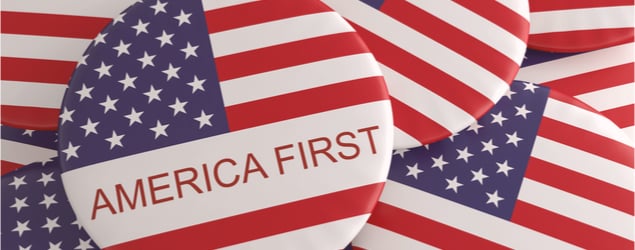What Vox’s Will Wilkinson Gets Right — and Horribly Wrong — about Trump and the Islamist Menace

I applaud Will Wilkinson’s essay at Vox.com criticizing the Trump administration’s view of the jihadist threat, but I can offer only one cheer, not three. Wilkinson tries to put the threat in perspective, and although he makes some important points, he exhibits a mile-wide blind spot. Thus, in his own way, Wilkinson fails to understand the Islamist menace, what enables it, and the urgent necessity of confronting it.
Let’s take stock of Wilkinson’s basic argument. His two main points line up with observations I’ve made in the past. First, he refutes the idea — apparently held by Trump’s advisor Steve Bannon among others in the administration — that the jihadists pose an existential threat, comparable to what we faced in World War II from Nazi Germany and the Soviets. When you look at the empirical data and compare military strength, however, the U.S. is in a class by itself. For example, Wilkinson notes, the “combined military budget of the nine biggest-spending Muslim-majority countries came to about $186 billion in 2015. The United States alone more than tripled that, spending $596 billion in 2015.”
The Islamic State (or ISIS) has some rifles, explosives, and pickup trucks, but no navy, no air force, nothing comparable to the vast war machine of Nazi Germany or the Soviets. So, however you tally the material strength of all the jihadists on the face of the globe, they are way, way overshadowed by America’s towering might.
When faced with the material weakness of ISIS as a military force, Wilkinson writes, “defenders of the [Trump administration’s] clash of civilizations view tend to retreat to the idea that radical Islam is waging war on the West in secret.”
And so Wilkinson’s second major point is to push back on this outlook, which holds that
Islam is essentially committed to the imposition of religious law, or sharia, on believers and nonbelievers alike.
In their heart of hearts, therefore, all Muslims are committed to replacing secular political authority with Islamic religious law.
Even if you grant the (false) premise that all Muslims everywhere share the worldview of ISIS, Wilkinson argues, within Europe and the United States, Muslims constitute a population too small to “replace secular, democratic government with sharia.” Even when you extrapolate thirty years into the future, “they still wouldn’t get close.”
Acknowledging (yet minimizing) the sporadic threat from jihadist terrorist attacks, Wilkinson contends that “the idea that anything at all about the Westcould be threatened by ‘stealth jihad’ is either an expression of studied ignorance or a form of malicious religious intolerance.” [Emphasis added.] The ultimate conclusion for Wilkinson is that, contra Bannon and others, no, “we aren’t at war” — neither in the open, nor hidden.
What Wilkinson gets right is that the enemy is materially weaker, a point that deserves special emphasis and which I’ve been hammering for years in my essays, talks, and books. Wilkinson is correct, too, that the jihadists are a subset within the Muslim world, not identical with it. It should go without saying that while all jihadist are self-described Muslims, it is false that all Muslims are jihadists — far from it. I identify the enemy not as a religion, but as an ideologically inspired movement seeking to impose religious doctrine as a total political system; I call it the Islamic totalitarian movement. And, I think he’s right to challenge the idea of a “stealth jihad”; in my view, we do face a threat, not from hidden conspiracies, but from everything the jihadists are doing in the open to negate the principles of a free society (which hints at Wilkinson’s blind spot).
Whereas Trump et al. are guilty of exaggerating the jihadist threat, however, Wilkinson ends up trivializing it. And, ironically for someone working at a libertarian think tank, he exhibits a kind of collectivist lack of concern for its bloody toll on actual, irreplaceable, individual human beings. That “cost,” it seems, is just something we have to accept. Wilkinson’s view of the threat betrays a serious failure to understand the jihadist movement, what empowers it, and why it’s so crucial that we confront it.
Though hardly an existential threat, the jihadist cause is waging war against us. It has not only inflicted many deaths; it has also subverted our freedom and, contra Wilkinson, already changed the way we live in the West. This has happened not because the jihadists are so materially strong. It’s happened because, despite being an unrivaled military superpower, we are morally and intellectually weak. We’ve let them harm us. On that point, Wilkinson, like many people, has a major blind spot.
Few people today grasp the importance of philosophic ideas in shaping how we frame foreign policy and how we responded to — or, rather, how we failed to confront — the jihadists. But you cannot properly understand the nature and scale of the threat, nor the failures of America’s post-9/11 response, without isolating the fundamental role of moral-philosophic ideas in our approach to the Islamists. I’ve written about this at length in Winning the Unwinnable War and Failing to Confront Islamic Totalitarianism: From George W. Bush to Barack Obama and Beyond; here I’ll sketch two illustrations — one on the battlefield, the other cultural.
On the Battlefield
Consider the Afghanistan war. Initially, unlike the Iraq war, it was widely seen as “the good war,” because after 9/11, many people felt that it made sense to go after the jihadist faction, Al Qaeda, behind the attacks, and their host, the Taliban, which ruled Afghanistan. Even though the United States, it bears repeating, is the most powerful military power in history; even though we faced fighters with outdated rifles, improvised explosive devices, and rusty pick-up trucks, the Afghanistan war has become the longest in our nation’s history. There’s no end in sight. Basically, the puny jihadist forces fought us to a stalemate (there’s been talk, on and off, of negotiating a settlement with the Taliban). Why?
You can find a lot of different explanations, for example, involving operational failures and poor leadership (both of which played a role), but the evidence points to something deeper. In that war, as I and my colleagues have argued at length, the moral ideas shaping U.S. policy were irrational and self-sacrificial. Their effect was to subvert the military mission. Instead of destroying the Taliban and allied forces, rendering the country non-threatening, we hamstrung our troops and allowed the enemy to scatter (and later surge back to power), while engaging in “nation building” (and in the process enshrining jihadist-friendly ideas in Afghanistan’s constitution). Our flagrant lack of moral clarity — about our purpose and our right to defeat the middling threat we faced — enabled and encouraged the jihadists. Today rival jihadist factions — mainly the Taliban and an offshoot of Islamic State — are jockeying for control of large swaths of Afghanistan, where Al Qaeda had based itself in the run-up to 9/11. The jihadists march on, because our policy lets them.
The Culture
Let’s turn to the culture, and consider a pillar of Western society, the principle of freedom of speech. Wilkinson, remember, dismisses “the idea that anything at all about the West could be threatened” by (hidden) Islamist subversion; he states that the “threat to European or American civilization is zilch.” The subversion, though, is far from hidden, and it has done significant harm already. Here again, the jihadists have advanced their cause, greatly undermining the freedom of speech, because — through our moral weakness — we’ve let them.
In his superb book, Defending Free Speech, my colleague Steve Simpson outlines how Islamists have sought to negate freedom of thought by threatening, and actually killing, those who dare criticize their ideas. The pattern goes back decades. One data point was the assassination in 2004 of a Dutch film maker, Theo Van Gogh, for a short video criticizing Islamic mores. Then, in 2005/06, a crisis erupted over cartoons of the prophet Mohammad, published in a Danish newspaper. The newspaper’s editors commissioned those cartoons because they had noticed signs of rampant self-censorship on the subject of Islam in European society, and they wanted to gauge the degree of the problem. What followed: Protests, boycotts, deadly riots, and at least 200 dead. The “cartoons crisis” had gone global.
What the agitators and murderers demanded in these and others cases is that their dogma about blasphemy supersede the principle of freedom of speech. The West’s dominant response? Did our political and intellectual leaders redouble their commitment to defending the principle of free speech? The prevailing response to the Danish cartoons crisis was pathetic. European leaders tripped over themselves in the rush to appease; the George W. Bush administration conveyed that it viewed the cartoons as offensive, and that perhaps they should not have been published in the first place.
The West’s inability to uphold so vital a right as the freedom of speech has only encouraged the jihadists — and substantively changed the way we live our lives. By the spring of 2006, Borders Books and Waldenbooks made it clear that they would not stock an upcoming issue of Free Inquiry magazine, because it reprinted some of the notorious cartoons. In 2009, Yale University Press published a scholarly analysis of the Danish cartoons crisis but, amid security concerns, removed every one of the twelve cartoons, along with other images, before going to press.
The appeasement by Western governments inspired more jihadist aggression. Fast forward to the massacre in 2015 at the Paris office of the magazine Charlie Hebdo. The magazine’s editors and contributors, having reprinted the Danish cartoons and published various satires on religion, were put to death because they “blasphemed.” The executioners had pledged allegiance to Islamic state. Five months later, there was another jihadist attack on free speech, on American soil, at a cartoon contest in Garland, Texas. Worse, after Charlie Hebdo and the Garland attacks, you could hear intellectuals essentially blaming the victims.
The jihadists, enabled by Western appeasement, have altered the culture of the West: to speak up against the ideas of the jihadists can mean risking your life. Ayaan Hirsi Ali, who collaborated with Theo Van Gogh on his film, lives under round-the-clock security. She is on an Al Qaeda hit list. So is Flemming Rose, the Danish journalist who commissioned the notorious cartoons (and who later had great difficulty finding a publisher for his book on the subject until the Cato Institute decided to publish the book). So are two of the cartoonists. The climate of self-censorship, already palpable in Europe a decade ago, is real, and it has reached American shores.
Wilkinson sees no chance that jihadists will tear the fabric of Western society. But clearly on freedom of speech, they already have.
It’s hard to see that, however, if you have a blind spot for the role of philosophic ideas in the American response to the jihadists — specifically, our moral-philosophic weakness and the appeasement which results from it. Fixing his attention narrowly on just the material strength of the jihadists, Wilkinson emphasizes that this conflict is massively lopsided in favor of America. It is. But that leaves us with (at best) an incomplete picture of the threat. Though the United States is far stronger materially, we’ve failed to defeat the Islamists on the battlefield, fundamentally because of the irrational moral ideas permeating, and subverting, our foreign policy. Our moral weakness works to the jihadists’ advantage. And, culturally, it is the abject failure to defend the freedom of thought that encourages the jihadists; the pattern of Western appeasement has advanced their cause.
The jihadist menace is serious. It does not constitute an existential threat in the way the Nazis or Soviets once did. But it has caused the deaths of thousands of Americans and many more throughout the Western world. Our tragic failure to deal with that very real threat and the fact that the jihadists are undefeated, galvanized, and advancing is the result of our moral-intellectual weakness. Our intellectual defaults and policy failures empower this feeble enemy.
* * *
Postscript. I should mention M.G. Oprea’s critique of Wilkinson in The Federalist, which brings up good points. Well worth reading.
(Originally published on Medium.)



